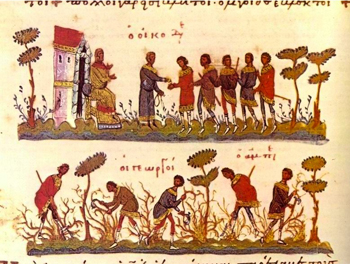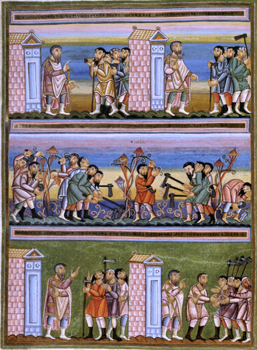The Rhetoric of Excess in The Parable of the Workers
by Dan Clendenin
For Sunday September 21, 2014
Lectionary Readings (Revised Common Lectionary, Year A)
Exodus 16:2–15 or Jonah 3:10–4:11
Psalm 105:1–6, 37–45 or Psalm 145:1–8
Philippians 1:21–30
Matthew 20:1–16
There's a market near my house where I like to shop called the Milk Pail. It's a funky place with a loyal following, a down-n-dirty contrast to the upscale Whole Foods Experience. A regular fixture at this grocery is a disheveled man who sits in his wheelchair at the entrance to the store. His puffy face is bright red. His legs are badly swollen.
As soon as I get out of my car, I can see this man, so there's plenty of time for the voices inside my head to debate whether to give him any money. Won't he spend it on alcohol? How will my single dollar help? Am I going to have to do this every time I shop here?
Sometimes I give him a dollar. Once in a while five dollars. But the last time I was at the Milk Pail, my smallest bill was a twenty. Should I give him twenty dollars?! Isn't that excessive?
Part of my problem was that during Lent last year I read through the four gospels, and one of the things I noticed was the exaggerated language that's repeatedly used to describe the generosity of God, life in God's kingdom, and our human responses to God's generosity.
The British literary critic Frank Kermode (1919–2010) called this phenomenon a "rhetoric of excess." Matthew in particular has what he calls a "quite unusual intensity" of rhetorical excess. We read about about a log in your eye, a camel going through the eye of a needle, and straining a gnat while swallowing a camel.
"Our righteousness must be produced to excess," observes Kermode, it must exceed that of the Pharisees. We must love not only our neighbors but also our enemies. We should give in secret, so that our left hand doesn't know what our right hand is doing — that is, hidden even from our own selves. Wise people leave their dead unburied. Foolish people build houses on sand and walk through wide gates.
 |
Parable of the workers in the vineyard, 11th-century Byzantine. |
Kermode suggests an awkward but literal translation of the original Greek in Matthew 5:47: "If ye greet only your brethren, what excess do ye?" He thus writes, "Excess is constantly demanded. Everything must be in excess."
Another example of excess that Kermode gives is the gospel this week about the workers in the vineyard. It's a story about a business owner with outrageous ideas about a fair wage. The punch line of the story shocked the listeners with a radical reversal that subverted conventional wisdom. And to make his point clear, Jesus repeats the punch line verbatim three times.
In God's kingdom, the first will be last and the last will be first.
The parable of the workers is preceded by a story about a rich man. When Jesus invited the man to sell his possessions and give his money to the poor, "he went away sad, because he had great wealth."
Peter then responded, "Lord, we have left everything to follow you. What then will there be for us?" The rich man kept all that he had; the disciples left all that they had. Jesus reassured them: "At the renewal of all things, many who are first will be last, and many who are last will be first."
Jesus follows this with a story about a foreman who hired some laborers early in the morning, then additional workers at the third, sixth, ninth, and eleventh hours. That evening, he paid the workers, "beginning with the last ones hired and going on to the first."
Whereas the first workers hired had endured "the burden of the work and the heat of the day" for twelve hours, the last workers hired at the eleventh hour worked just one hour. In fact, they had "stood there all day long doing nothing." Nonetheless, the last people hired received twelve hours of pay for one hour of work.
The laborers who had worked twelve hours "grumbled against the landowner." Of course they grumbled! It wasn't fair, not by a long shot.
But the excessive generosity of God is different than getting what you earned. And so for the third time Jesus says, "the last will be first, and the first will be last."
Jesus concludes with a sharp question to those who grumbled about God's excess: "Are you envious because I am generous?"
The alternate reading from Jonah makes this same point. When God had compassion on the pagan Ninevites, Jonah complained bitterly in words that echo the grumblers in Jesus's parable: "I knew that you were a gracious and compassionate God, slow to anger and abounding in love, a God who relents from sending calamity."
When Jonah finally preached to Israel's pagan conquerors, the unthinkable happened. The city famed for cruelty and wickedness believed the message and repented. The king proclaimed a national day of civic repentance.
Jonah found it hard to believe that Nineveh was a city “important to God.” It was a city for which God had great compassion (3:10). And just as Jesus asked the grumblers a question, so God asked Jonah a question in the very last sentence of this story: "Should I not be concerned about that great city?"
The "rhetoric of excess" isn't limited to Matthew, which was Kermode's focus. It's everywhere.
 |
Parable of the workers in the vineyard, 11th-century codex. |
The gospel for last week is another example. Jesus told us to forgive a person 490 times — "seventy times seven." Divine forgiveness, given and received, is beyond calculation or comprehension. Forgiveness on that scale is wildly disproportionate to the sincerity of the penitent or the seriousness of their offense.
Some disciples quit their jobs.
Others left their families, like the rich women who itinerated with Jesus and supported him.
One woman anointed Jesus with a bottle of perfume worth $50,000 in today's wages.
Luke compares God to a shepherd who abandons a flock of ninety-nine sheep in order to find one lost sheep. In the parable of the prodigal son he's like an indulgent father who welcomes back his indigent son with the best party that money could buy, despite the anger of the older son at such excessive generosity.
John compares God's kingdom to a wedding party with an outrageous excess of fine wine. He says that the whole world couldn't contain enough books to describe the deeds of Jesus.
In the book of Acts some people sold property and distributed the proceeds to the Jesus movement.
Yes, I gave the man at the Milk Pail my twenty dollar bill. It was an honest effort to imitate the excessive generosity of God by doing something that defied common sense or conventional wisdom.
The irony is that, compared to the gospel's rhetoric of excess, my twenty dollars was at best a pale imitation of the generosity of God. You could even say that it was more parsimonious than profligate. I gave out of the surplus of my wealth. I seem to recall a widow described by Jesus who despite her extreme poverty "gave everything she had to live on."
For further reflection:
* Watch the Danish film Babette's Feast (1988). The story is set in the late nineteenth century and takes place in a small fishing village on the dank and dreary Jutland coast of Denmark. A band of dour Christians learn the meaning of God's extravagance from a most unlikely source. The movie Chocolat (2000) tells a similar story about a small village in 1950s France.
* See Frank Kermode, "Matthew," in Robert Alter and Frank Kermode, eds., A Literary Guide to the Bible (Cambridge: Harvard University Press, 1987), pp. 378–401.
Image credits: (1) Roundchurch.ca and (2) Marysrosaries.com.





